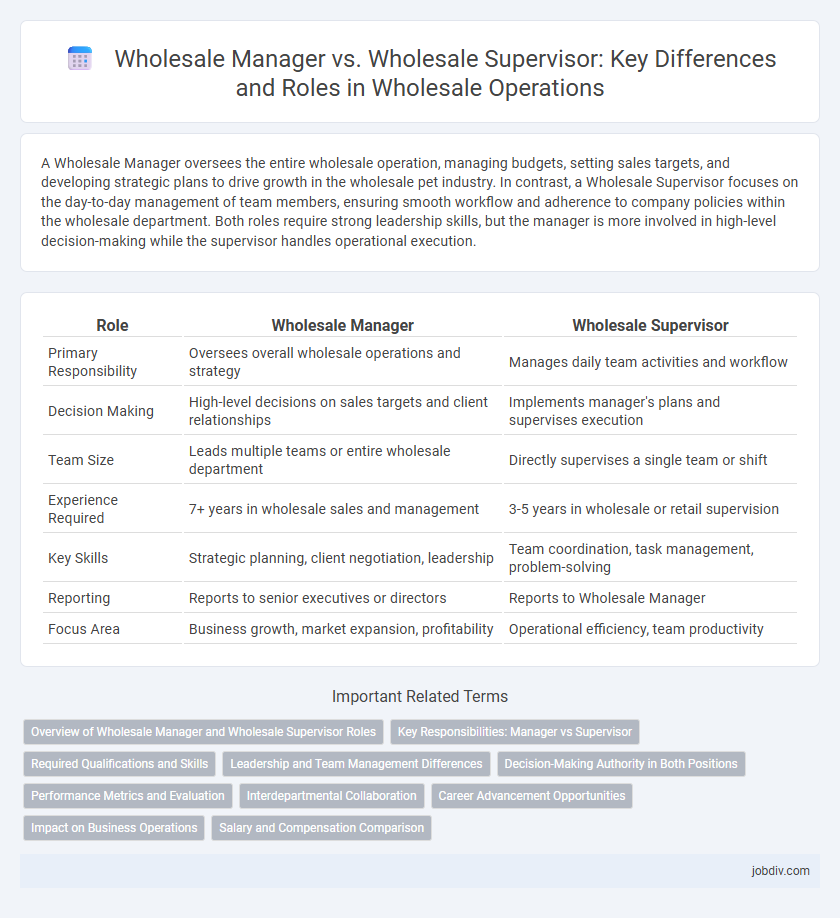A Wholesale Manager oversees the entire wholesale operation, managing budgets, setting sales targets, and developing strategic plans to drive growth in the wholesale pet industry. In contrast, a Wholesale Supervisor focuses on the day-to-day management of team members, ensuring smooth workflow and adherence to company policies within the wholesale department. Both roles require strong leadership skills, but the manager is more involved in high-level decision-making while the supervisor handles operational execution.
Table of Comparison
| Role | Wholesale Manager | Wholesale Supervisor |
|---|---|---|
| Primary Responsibility | Oversees overall wholesale operations and strategy | Manages daily team activities and workflow |
| Decision Making | High-level decisions on sales targets and client relationships | Implements manager's plans and supervises execution |
| Team Size | Leads multiple teams or entire wholesale department | Directly supervises a single team or shift |
| Experience Required | 7+ years in wholesale sales and management | 3-5 years in wholesale or retail supervision |
| Key Skills | Strategic planning, client negotiation, leadership | Team coordination, task management, problem-solving |
| Reporting | Reports to senior executives or directors | Reports to Wholesale Manager |
| Focus Area | Business growth, market expansion, profitability | Operational efficiency, team productivity |
Overview of Wholesale Manager and Wholesale Supervisor Roles
Wholesale Managers oversee the entire wholesale distribution process, managing large teams and developing strategic sales plans to optimize revenue and market reach. Wholesale Supervisors focus on daily operations, ensuring team productivity and compliance with company policies while supporting the manager's broader objectives. Both roles require strong leadership and industry knowledge, but managers hold greater responsibility for financial performance and strategic decision-making.
Key Responsibilities: Manager vs Supervisor
Wholesale Managers oversee strategic planning, client relationship management, and sales target achievement, ensuring alignment with company goals. Wholesale Supervisors focus on daily team coordination, monitoring staff performance, and implementing operational tasks to support sales activities. Managers prioritize long-term business growth while Supervisors manage immediate workflow and staff supervision on the ground.
Required Qualifications and Skills
A Wholesale Manager typically requires advanced qualifications in business administration or supply chain management, along with proven leadership skills, strategic planning abilities, and expertise in market analysis. A Wholesale Supervisor often needs practical experience in inventory control, team coordination, and operational management, emphasizing strong communication and problem-solving skills. Both roles benefit from proficiency in sales techniques, negotiation, and knowledge of wholesale distribution processes.
Leadership and Team Management Differences
A Wholesale Manager typically holds a higher leadership role, responsible for strategic decision-making, overseeing multiple teams, and driving overall sales performance. In contrast, a Wholesale Supervisor focuses on direct team management, ensuring daily operations run smoothly, and mentoring frontline staff. The manager emphasizes long-term planning and cross-department coordination, while the supervisor prioritizes hands-on support and immediate problem-solving within the team.
Decision-Making Authority in Both Positions
Wholesale Managers hold higher decision-making authority, overseeing strategic planning, pricing policies, and major client negotiations. Wholesale Supervisors typically execute decisions made by managers, focusing on daily operational control and team management within defined guidelines. The manager's role involves broader responsibility for revenue targets and market expansion, while supervisors ensure smooth workflow and adherence to company protocols.
Performance Metrics and Evaluation
Wholesale Managers are responsible for setting and analyzing key performance indicators (KPIs) such as sales volume, order accuracy, and client retention rates to drive overall business growth. Wholesale Supervisors focus on daily operational metrics including staff productivity, inventory turnover, and fulfillment speed to ensure smooth execution of sales orders. Evaluation for Managers emphasizes strategic goal achievement and revenue growth, while Supervisors are assessed on team performance and adherence to process standards.
Interdepartmental Collaboration
A Wholesale Manager leads interdepartmental collaboration by coordinating strategic planning and aligning sales objectives with marketing and supply chain teams to optimize overall performance. The Wholesale Supervisor facilitates day-to-day communication between warehouse staff and sales representatives, ensuring efficient order fulfillment and immediate issue resolution. Both roles require strong communication skills, but the manager focuses on broader coordination while the supervisor manages operational implementation.
Career Advancement Opportunities
Wholesale Managers typically oversee broader strategic operations and have higher decision-making authority compared to Wholesale Supervisors, positioning them for senior leadership roles. Wholesale Supervisors manage day-to-day team activities and operational workflows, providing valuable frontline experience that can lead to promotions into manager roles. Career advancement from Wholesale Supervisor to Wholesale Manager often involves developing skills in strategic planning, financial management, and team leadership within the wholesale industry.
Impact on Business Operations
A Wholesale Manager oversees strategic planning, client relations, and overall sales targets, significantly driving revenue growth and market expansion. In contrast, a Wholesale Supervisor manages day-to-day team performance, inventory control, and order processing, ensuring operational efficiency and timely fulfillment. Both roles synergize to optimize business operations, with managers focusing on long-term goals while supervisors maintain smooth daily workflows.
Salary and Compensation Comparison
Wholesale Managers typically earn higher salaries than Wholesale Supervisors due to their broader responsibilities and decision-making authority, with average annual salaries ranging from $70,000 to $90,000 compared to $50,000 to $65,000 for supervisors. Compensation packages for Wholesale Managers often include performance bonuses, profit sharing, and comprehensive benefits, reflecting their critical role in driving sales and managing client relationships. Wholesale Supervisors generally receive standard benefits and smaller incentive bonuses tied to team performance and operational efficiency.
Wholesale Manager vs Wholesale Supervisor Infographic

 jobdiv.com
jobdiv.com